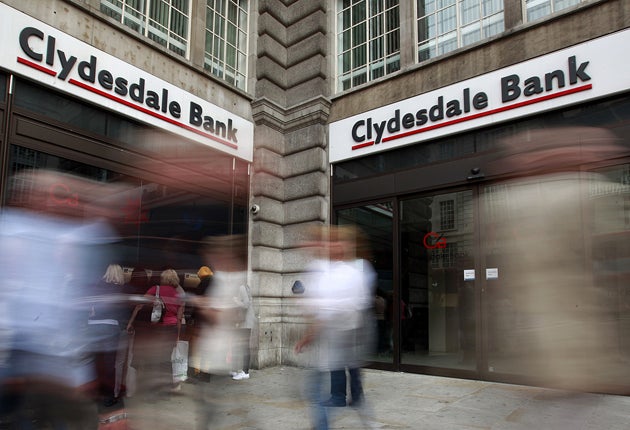Julian Knight: Don't bank on Clydesdale – it can't add up

Your support helps us to tell the story
From reproductive rights to climate change to Big Tech, The Independent is on the ground when the story is developing. Whether it's investigating the financials of Elon Musk's pro-Trump PAC or producing our latest documentary, 'The A Word', which shines a light on the American women fighting for reproductive rights, we know how important it is to parse out the facts from the messaging.
At such a critical moment in US history, we need reporters on the ground. Your donation allows us to keep sending journalists to speak to both sides of the story.
The Independent is trusted by Americans across the entire political spectrum. And unlike many other quality news outlets, we choose not to lock Americans out of our reporting and analysis with paywalls. We believe quality journalism should be available to everyone, paid for by those who can afford it.
Your support makes all the difference.'You can bank on us, not just with us" proudly proclaims Clydesdale Bank's website. Elsewhere, the bank brandishes its utterly meaningless slogan that it is "always thinking".
But whoever has been calculating its customers' mortgage payments must have let their minds wander. Some 18,000 customers, it was revealed last week, have been undercharged by Clydesdale and its sister bank, Yorkshire. In its press release, Clydesdale says the calculation error was "exacerbated by last year's unprecedented falls in interest rates". I have news for Clydesdale – last year was one of the most stable periods for interest rates in UK history. Rates were cut from 1.5 to 0.5 per cent and then left in place for nine months. Another indication that the "always thinking" bank can't do its maths.
The truth is that no one is to blame for the almighty cock-up other than Clydesdale and Yorkshire. But that hasn't stopped the banks writing to account holders demanding that they make up the shortfall, and those who can't afford it – having spent the money in good faith – will have their cases "reviewed individually so that their full circumstances can be assessed and the most appropriate solution found". In English, that probably means the debt collectors will be calling.
The banks have survived perfectly well without this cash from mortgage borrowers for ages, so why don't they write it off and readjust future payments? The answer that they're banks and can get away with virtually anything as long as it's in their interminable terms and conditions. So much for the Financial Services Authority's idea that institutions should treat customers fairly.
Some customers, meanwhile, want compensation because the amounts owed on their mortgages haven't been falling as fast as they would if payments had been correct. What a mess. And it is the two banks that should bear the full costs of sorting it out – not their customers. After all, can we really "bank on" Clydesdale and Yorkshire getting their mortgage payments right this time?
No NS&I? No choice
National Savings has pulled the plug (see page 90) on their inflation-tracking savings products. This is a shame, as the idea of protecting against inflation appeals to millions of savers. With the focus on coming out of recession, and fears over deflation and credit crunch mark two (involving sovereign debt and the solvency of European banks), attention has shifted from the quiet inflation making us all poorer. Under normal circumstances, with inflation over 5 per cent, interest rates would be around the same level or higher, thus rebalancing savings returns and negating the need for inflation-proof accounts.
Now NS&I's decision no doubt has a lot to do with private-sector pressure. The banks and building societies have long felt disquiet that NS&I sucks in too much cash which they need to oil their businesses. With a Tory-led coalition, the banks will get more of a hearing, and their arguments key into the zeitgeist of stopping the public sector squeezing out the private sector.
But having put NS&I back in its place, what can we expect from banks and building societies? There will be a lot of extra capital looking for a home, and if we were talking about a normal free market we'd see an institution step forward with its own inflation-proof product, or at least a variant offering some protection against rising prices. But the sector is distorted with semi-nationalised banks and busted brands but few real players. We have dozens of institutions but only a couple – Santander and HSBC spring to mind – have a degree of consumer trust and pockets deep enough to offer the rates.
So what happens now that NS&I has pulled up the drawbridge? I fear consumer choice won't improve and those rightfully worried by inflation will have to make do with meagre fare from the banks and the all-too-familiar marketing tricks of short-term introductory bonuses.
Join our commenting forum
Join thought-provoking conversations, follow other Independent readers and see their replies
Comments